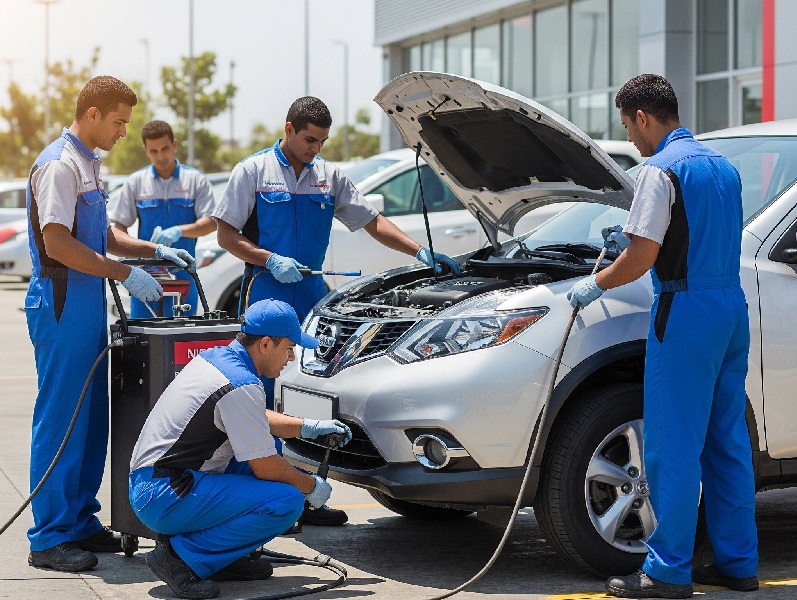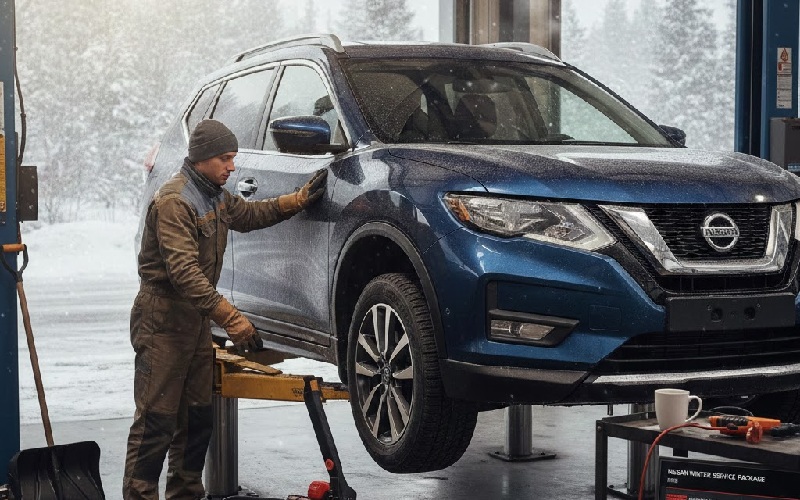A Guide To Essential Summer Vehicle Service in Hot Weather
Summer brings unique challenges for vehicle maintenance and performance. While many drivers associate vehicle troubles with winter’s freezing temperatures, the heat and increased travel during summer months can place significant stress on your vehicle’s systems. Properly maintaining your vehicle during this season not only ensures reliability for those long road trips but also improves safety, […]
Summer brings unique challenges for vehicle maintenance and performance. While many drivers associate vehicle troubles with winter’s freezing temperatures, the heat and increased travel during summer months can place significant stress on your vehicle’s systems. Properly maintaining your vehicle during this season not only ensures reliability for those long road trips but also improves safety, efficiency, and the longevity of your investment.

Cooling System Service
Perhaps the most critical summer vehicle service is a thorough inspection and maintenance of your cooling system. With outside temperatures frequently exceeding 30°C, your engine relies heavily on its cooling system to maintain optimal operating temperatures. A comprehensive cooling system service includes:
- Pressure testing the entire system to check for leaks
- Inspecting the radiator, water pump, and hoses for damage or wear
- Checking coolant condition, concentration, and level
- Examining the thermostat for proper operation
- Cleaning debris from radiator fins to improve heat dissipation
Coolant degrades over time, losing its ability to protect against corrosion and maintain proper cooling properties. Most manufacturers recommend coolant replacement every 60,000 kilometers or five years, whichever comes first. Using the wrong coolant concentration can lead to reduced cooling efficiency or even engine damage in extreme cases.
Air Conditioning System Check
Summer comfort depends mainly on a properly functioning air conditioning system. Beyond simple comfort, air conditioning helps maintain driver alertness during hot weather. A complete A/C summer vehicle service includes:
- Checking refrigerant levels and pressure
- Inspecting compressor operation
- Cleaning or replacing cabin air filters
- Examining belts and hoses connected to the A/C system
- Testing temperature output at vents
Low refrigerant levels not only reduce cooling performance but can damage the compressor. Modern vehicles use environmentally friendly refrigerants that require specialized equipment for proper summer vehicle service and recycling.
Battery Inspection and Service
While cold weather gets much attention for battery issues, extreme heat actually causes more long-term damage to batteries. Heat accelerates internal corrosion and water evaporation from the electrolyte solution. A proper battery summer vehicle service includes:
- Load testing to verify capacity and performance
- Cleaning terminals and connections to ensure proper conductivity
- Checking for proper mounting and security
- Inspecting the case for cracks, bulges, or leaks
- Testing the charging system to ensure proper voltage regulation
Modern batteries typically last 3-5 years, but high temperatures can significantly reduce this lifespan. Vehicles regularly exposed to temperatures above 32°C may experience battery failure in as little as two years without proper maintenance.
Tire Maintenance and Rotation
Summer heat significantly impacts tire performance and safety. Hot pavement increases the operating temperature of tires, potentially leading to blowouts if they’re improperly maintained. Summer vehicle service should include:
- Checking tire pressure when cool (typically 30-35 PSI for passenger cars)
- Inspecting tread depth (minimum 1.6mm, though 3mm is recommended for wet conditions)
- Examining sidewalls for cracks, bulges, or damage
- Rotating tires to ensure even wear
- Balancing wheels to prevent vibration and uneven wear
For every 5°C increase in temperature, tire pressure typically rises by about 1 PSI. However, this doesn’t mean you should underinflate your tires – always follow the manufacturer’s recommendations for the proper cold inflation pressure.
Brake System Inspection
Summer road trips often involve mountain driving or towing, which places additional stress on brake systems. Heat buildup from extended brake use can lead to brake fade – a dangerous condition where braking power decreases. A thorough brake inspection includes:
- Measuring pad thickness (typically replacing at 3mm or less)
- Checking rotor condition for scoring, warping, or cracking
- Testing brake fluid for contamination and proper boiling point
- Inspecting callipers for proper operation and seal condition
- Examining brake lines for leaks or damage
Brake fluid is hygroscopic, meaning it absorbs moisture over time. This reduces its boiling point and can lead to brake fade during heavy use. Most manufacturers recommend replacing brake fluid every two years, regardless of mileage.
Oil and Filter Change
Engine oil works harder in summer heat, particularly during stop-and-go traffic or when towing. Higher operating temperatures accelerate oil breakdown, reducing its lubricating properties. A proper oil summer vehicle service includes:
- Draining old oil and replacing the filter
- Using the manufacturer-recommended viscosity grade (often a higher viscosity for summer)
- Checking for leaks after service
- Resetting the oil life monitor if equipped
- Inspecting other fluid levels while underneath the vehicle
Most modern vehicles specify synthetic oils that provide better high-temperature stability and protection. Follow your vehicle’s recommended oil change interval, but consider more frequent changes if regularly driving in extreme heat or dusty conditions.
Things You Might Not Know About A Summer Vehicle Service
- Brake fluid boiling points can drop by up to 50°C as moisture content increases from 0% to just 3%, significantly increasing the risk of brake fade during summer mountain driving
- Running your air conditioning for 10 minutes each week during winter helps maintain compressor seals and extends system life, preventing summer breakdowns
- Synthetic oils can maintain their lubricating properties at temperatures up to 30°C higher than conventional oils, providing superior protection during extreme summer heat
- The UV radiation in sunlight breaks down rubber components like belts and hoses at the molecular level, with deterioration accelerating at temperatures above 25°C
- Cooling system pressure increases by approximately 7 kPa for every 1°C rise in coolant temperature, which is why pressure testing is crucial for detecting potential leaks before they cause overheating
Frequently Asked Questions About A Summer Vehicle Service
How often should I check my tire pressure during the summer?
- Check tire pressure at least once every two weeks during summer, preferably when tires are cold (driven less than 2 kilometers). Properly inflated tires enhance safety, improve fuel economy, and prolong tire life.
Is it normal for my vehicle to use more fuel during the summer?
- Yes, fuel consumption can increase by 10-15% due to several factors: air conditioning use, lower air density, increased traffic congestion, and more frequent short trips. Regular maintenance helps minimize this increase.
How can I tell if my air conditioning system needs refrigerant?
- If your air conditioning doesn’t cool below 10°C at the vents, makes unusual noises when operating, cycles on and off frequently, or produces unpleasant odours, it likely needs servicing. Never add refrigerant without properly diagnosing the issue.
Does summer heat really affect my battery?
- Yes, heat accelerates chemical reactions inside batteries, causing faster internal corrosion and water evaporation from the electrolyte. A battery that struggles in summer will almost certainly fail in winter.
Should I wash my car more often in summer?
- Yes, washing your vehicle every 1-2 weeks in summer helps remove tree sap, bird droppings, and insects that can damage paint when baked by the sun. Regular washing also helps identify potential issues like fluid leaks.
Is it better to use my air conditioning or open windows for fuel efficiency?
- At speeds below 60 km/h, open windows typically use less fuel. At higher speeds, the aerodynamic drag from open windows consumes more fuel than using the air conditioner.
How often should I replace my wiper blades in summer?
- Inspect wiper blades monthly during summer. UV radiation and heat can cause rubber deterioration in as little as three months. Replace blades that show cracking, stiffness, or streaking during operation.
What’s the best way to prevent my car’s interior from excessive heat damage?
- Use a windshield sunshade, park in shaded areas when possible, crack windows slightly to reduce heat buildup, and consider applying UV protectant to interior surfaces every 30-60 days.
How does summer heat affect my brake performance?
- Excessive heat can cause brake fade—a condition where braking power decreases as components overheat. This is particularly common during mountain driving or when towing. Regular brake fluid replacement helps prevent this dangerous condition.
Should I change to a different oil viscosity for summer driving?
- Follow your vehicle manufacturer’s recommendations, which often include a range of acceptable viscosities. If multiple options are approved, the higher viscosity option (like 10W-30 instead of 5W-30) may provide better protection during sustained high temperatures.


